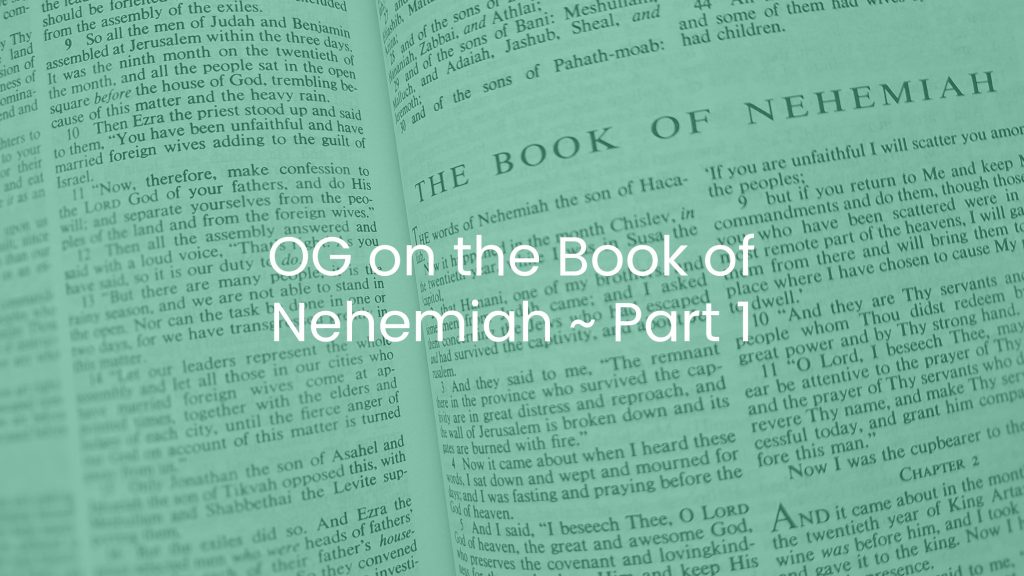|
Getting your Trinity Audio player ready...
|
The Book of Nehemiah is a journal.
Being the only book of the Bible written from this personal perspective, we can literally read the thoughts of a great man of God as he confronts and struggles through his greatest challenge.
Now it happened in the month of Chislev, in the twentieth year, as I was in Susa the citadel (Nehemiah 1:1, ESV).
The book starts on a normal day.
Often, our important days begin without the knowledge of what will soon transpire. We can’t be aware of our future, but we can be prepared. Reading Nehemiah’s journal, we find a man full of courage who understands prayer and lives his life based on Biblical wisdom.
God had prepared him for this normal day that became a series of events that would change his life, the history of the Jews, and world events from that time forward.
Not knowing our future, are we ready to obey God’s will?
(Note: The month of Chislev is the ninth month on the Jewish calendar, occurring in November and December on our Gregorian calendar. Susa was a winter fortress for Persian kings. We shall find out later from Nehemiah’s journal that he was a cupbearer for King Artaxerxes.)
Hanani, one of my brothers, came with certain men from Judah. And I asked them concerning the Jews who escaped, who had survived the exile, and concerning Jerusalem (1:2).
A normal day — and Nehemiah’s brother stops by.
Nehemiah hasn’t seen his brother for a long time because his brother has been on a trip to Jerusalem. Every Jew in Nehemiah’s time would love Jerusalem and know this passage from the Psalms. . .
Pray for the peace of Jerusalem! “May they be secure who love you! Peace be within your walls and security within your towers!” (Psalm 122:6-7).
Let’s pause for a moment to answer this question: Why was Nehemiah in Susa, a citadel of the Persians? Nehemiah’s location indicated his position in the government.
As we note in the books of Daniel and Ezra, the Jews from Jerusalem had been taken captive by the Babylonians, and the city destroyed. Seventy years later, a remnant of Jews returned to rebuild the temple. But then, the Persians conquered the Babylonians, and the reconstruction of Jerusalem languished for about one hundred years until Nehemiah’s time.
Now, a century later, Nehemiah’s brother and other Jews that he had traveled with to Jerusalem visited him in Susa. Nehemiah, a God-loving Jew, quickly inquired about the “peace of Jerusalem” and received this report from his brother and his brother’s companions.
As Nehemiah records in his journal. . .
They said to me, “The remnant there in the province who had survived the exile is in great trouble and shame. The wall of Jerusalem is broken down, and its gates are destroyed by fire” (Nehemiah 1:3).
What would we do? Probably say, “Wow, that’s too bad. We must keep them in our prayers and maybe even send an offering.”
What was Nehemiah’s response? As he writes. . .
As soon as I heard these words I sat down and wept and mourned for days, and I continued fasting and praying before the God of heaven (Nehemiah 1:4).
Nehemiah was overwhelmed with a burden for the city of Jerusalem.
What could he do about this situation? Was he prepared? Where would he get the resources? Yes, many questions, but we find quickly that Nehemiah had the courage (and opportunity) to do something!
Enough on Nehemiah now in this Interruption, but next Monday, I will write The OG on the Book of Nehemiah ~ Part 2, discovering more from Nehemiah’s journal on how he followed God’s calling.
Until then. . .

